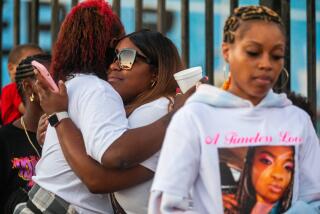Guilty Verdict Urged in Jehovah’s Witness Case
- Share via
Drunk driver Keith Cook killed Jadine Russell with his speeding truck as surely as if he had gunned her down--and neither the Azusa woman’s beliefs as a Jehovah’s Witness nor her refusal to take a blood transfusion should save Cook from a murder conviction, a prosecutor told a Pomona Superior Court jury Monday.
Deputy Dist. Atty. Larry Larson said in closing arguments to the jury that although Russell’s refusal to accept blood contributed to her death, it is Cook who must be held responsible for forcing the mother of five to make that fateful choice.
“He set in motion a chain of events that eventually led to the death of Jadine Russell,” Larson said. “You can conclude that the lack of a transfusion was a contributing factor in her death. . . . But he can’t rely on someone saving him from these actions that he has caused.”
The trial of the 32-year-old auto mechanic has drawn attention from the national media and legal experts because of a novel defense.
Cook’s lawyers have said he should be exonerated of vehicular murder because Russell’s refusal of blood transfusions really killed her.
Addressing the jury Monday afternoon, defense attorney Charles Unger argued that Cook might be held responsible for the accident last March 7 along Sierra Madre Avenue in Azusa.
But Unger said that Russell’s death was in her own hands.
The 55-year-old woman repeatedly told paramedics and doctors at County-USC Medical Center that her religious beliefs prohibited her from taking blood, even if she could die.
“Of course she is entitled to religious freedom,” Unger told the jury.
“But that is not what we are talking about. We are talking about the consequences of her exercise of her religion. Because she chose not to take blood she died. This was a choice made by Mrs. Russell.”
The jury’s determination of whether Russell should effectively take responsibility for her own death is a critical one.
If her refusal of blood superseded Cook’s actions that night, he would avoid a conviction for second-degree murder and a sentence of 15 years to life in prison.
The jury could also convict Cook of gross vehicular manslaughter or driving under the influence and causing great bodily injury.
The lesser charge, essentially conceded by the defense, could carry a penalty of as little as four years in prison, Unger said.
The ninth day of the trial was a long one for both families.
Jadine Russell’s husband, James, frequently closed his eyes as the two lawyers described how his wife’s car was rammed that night by Cook. Three of the woman’s daughters cried at times during the presentation.
Just across the aisle, Cook’s father, James, put one hand to his face as Larson said his son “did something so reckless and so dangerous he didn’t really care if anyone died or not.”
Larson said witnesses showed that Cook began drinking on his own the afternoon of March 7, 1998, before buying a keg of beer for a birthday party.
An expert estimated that to reach his eventual 0.17% blood-alcohol level, Cook must have had more than 13 beers over more than five hours.
Larson said Cook had been put on notice following a previous drunk driving conviction and subsequent probation about the dangers of driving drunk.
He said the fact Cook persisted in his behavior demonstrated the malice necessary for a murder conviction.
A critical instruction read to the jury by Judge Reginald Yates said: “If you find the defendant’s conduct was a cause of death, then it is no defense that the conduct of some other person, even the injured or deceased person, contributed to the death.”
The lack of a transfusion would have to be so “disconnected and unforeseeable” as to supersede the accident and absolve the defendant of murder, the judge’s instruction continued.
Defense attorney Unger addressed the jury for two hours and said the case is much more complicated than depicted by the prosecution.
He reminded jurors of conflicting statements by expert witnesses that put Cook’s speed as low as 50 mph, just 10 mph over the speed limit and not the 73 mph suggested by Larson.
More to Read
Sign up for Essential California
The most important California stories and recommendations in your inbox every morning.
You may occasionally receive promotional content from the Los Angeles Times.













